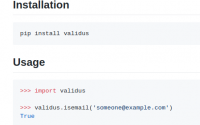在进行Web应用程序开发的时候,人们经常会用Session存储数据。但可能有人不知道,在PHP中,Session使用不当可能会引起并发问题。印度医疗行业软件解决方案提供商Plus91 Technologies高级工程师Kishan Gor在个人博客上对这个问题进行了阐释。 如果同一个客户端并发发送多个请求,而每个请求都使用了Session,那么PHP Session锁的存在会导致服务器串行响应这些请求,而不是并行。这是因为在默认情况下,PHP使用文件存储Session数据。对于每一个新的 Session,PHP会创建一个文件,并持续向其中写入数据。所以,每次调用session_start()方法,就会打开Session文件,并取得 文件的独占锁。这样,如果服务器脚本正在处理一个请求,而客户端又发送了一个同样需要使用Session的请求,那么后一个请求会阻塞,直至前一个请求处 理完成释放了文件上的独占锁。不过,这只限于来自同一个客户端的多个请求,也就是说,来自一个客户端的请求并不会阻塞另一个客户端的请求。 如果脚本很短,这通常没有问题。但如果脚本运行时间比较长,那就可能会产生问题。在现代Web应用程序开发中,有一个非常常见的情况,就是使用…
January 15, 2019
php 和 python 通用加密解密, php-python-encrypt-decrypt, 跨平台加密解密
php 版:
<?php
/**
* Valid encryption methods AES-256-CFB
*
* $cypher = new MyCypher($iv);
* $php_encrypted = $cypher->encrypt('test');
* $php_decrypted = $cypher->decrypt($php_encrypted);
*/
class MyCypher {
private $key = 'my-key-for-testing';
private $iv = 'testing-iv';
private $method = "AES-256-CFB";
private $blocksize = 32;
private $padwith = '`';
/*
* construct for cypher class - get, set key and iv
*/
function __construct($iv = '', $key = '')
{
if (is_string($key) AND $key) $this->key = $key;
if (is_string($iv) AND $iv) $this->iv = $iv;
}
/*
* get hased key - if key is not set on init, then default key wil be used
*/
private function getKEY()
{
if (!$this->key) die('Key not set!');
return substr(hash('sha256', $this->key), 0, 32);
}
/*
* get hashed IV value - if no IV values then it throw error
*/
private function getIV()
{
if (!$this->iv) die('IV not set!');
return substr(hash('sha256', $this->iv), 0, 16);
}
/*
* Encrypt given string using AES encryption standard
*/
public function encrypt($secret)
{
try
{
$padded_secret = $secret . str_repeat($this->padwith, ($this->blocksize - strlen($secret) % $this->blocksize));
$encrypted_string = openssl_encrypt($padded_secret, $this->method, $this->getKEY(), OPENSSL_RAW_DATA, $this->getIV());
$encrypted_secret = base64_encode($encrypted_string);
return $encrypted_secret;
}
catch (Exception $e) {
die('Error : ' . $e->getMessage());
}
}
/*
* Decrypt given string using AES standard
*/
public function decrypt($secret)
{
try
{
$decoded_secret = base64_decode($secret);
$decrypted_secret = openssl_decrypt($decoded_secret, $this->method, $this->getKEY(), OPENSSL_RAW_DATA, $this->getIV());
return rtrim($decrypted_secret, $this->padwith);
}
catch (Exception $e) {
die('Error : ' . $e->getMessage());
}
}
}
//$cypher = new MyCypher();
//$php_encrypted = $cypher->encrypt('test');
//$php_decrypted = $cypher->decrypt($php_encrypted);
//
//echo $php_encrypted."\n".$php_decrypted."\n";
//g4ZTzk8cqOF1+GbrwuuNZ63Jqn3XEaxLRDo/Pdl8OXs=
//test
python 3.x 版:
#!/usr/bin/env python
# encoding: UTF-8
# Python Class for AES encryption
"""
Example Usage
enc_str = cipher.encrypt('secret')
dnc_str = cipher.decrypt(enc_str)
print(enc_str,dnc_str)
"""
from Crypto.Cipher import AES
import base64
import hashlib
import sys
class Cryptor:
# Default Key for encryption
rawkey = 'my-key-for-testing'
rawiv = 'testing-iv'
method = AES.MODE_CFB
blocksize = 32 # 16, 32..etc
padwith = '`' # padding value for string
# lambda function for padding
pad = lambda self, s: s + (self.blocksize - len(s) % self.blocksize) * self.padwith
"""
construct for cypher class - get, set key and iv
"""
def __init__(self, iv=None, key=None):
self.key = key if key is not None else self.rawkey
self.iv = key if iv is not None else self.rawiv
"""
get hased key - if key is not set on init, then default key wil be used
"""
def getKEY(self):
if not self.key:
sys.exit('key error')
return hashlib.sha256(str(self.key).encode('utf-8')).hexdigest()[:32]
"""
get hashed IV value - if no IV values then it throw error
"""
def getIV(self):
if not self.iv:
sys.exit('iv error')
return hashlib.sha256(str(self.iv).encode('utf-8')).hexdigest()[:16]
"""
Encrypt given string using AES encryption standard
"""
def encrypt(self, text):
cipher = AES.new(self.getKEY(), self.method, self.getIV(), segment_size=128)
return base64.b64encode(cipher.encrypt(self.pad(text)))
"""
Decrypt given string using AES standard
"""
def decrypt(self, encrypted):
encrypted = base64.b64decode(encrypted)
cipher = AES.new(self.getKEY(), self.method, self.getIV(), segment_size=128)
return str(cipher.decrypt(encrypted), encoding = "utf-8").rstrip(self.padwith)
# if __name__ == '__main__':
# aaa = Cryptor()
# enc_str = aaa.encrypt('test')
# print(enc_str)
# b'g4ZTzk8cqOF1+GbrwuuNZ63Jqn3XEaxLRDo/Pdl8OXs='
#
# dec_str = aaa.decrypt(enc_str)
# print(dec_str)
# test

python 2.x 版:
#!/usr/bin/env python2
#encoding: UTF-8
# Python Class for AES encryption
"""
Example Usage
enc_str = cipher.encrypt('secret')
enc_str = cipher.decrypt(enc_str)
print enc_str; #secret
"""
from Crypto.Cipher import AES
import base64
import hashlib
import sys
class MyCypher:
#Default Key for encryption
rawkey = 'my-key-for-testing'
rawiv = 'my-key-for-testing'
method = AES.MODE_CFB
blocksize = 32 # 16, 32..etc
padwith = '`' # padding value for string
#lambda function for padding
pad = lambda self, s: s + (self.blocksize - len(s) % self.blocksize) * self.padwith
"""
construct for cypher class - get, set key and iv
"""
def __init__(self, iv='', key=''):
if(not key):
key = self.rawkey
if(not iv):
iv = self.rawiv
self.key = key
self.iv = iv
"""
get hased key - if key is not set on init, then default key wil be used
"""
def getKEY(self):
if(not self.key):
sys.exit()
return hashlib.sha256(self.key).hexdigest()[:32]
"""
get hashed IV value - if no IV values then it throw error
"""
def getIV(self):
if(not self.iv):
sys.exit()
return hashlib.sha256(self.iv).hexdigest()[:16]
"""
Encrypt given string using AES encryption standard
"""
def encrypt(self, raw):
cipher = AES.new(self.getKEY(), self.method, self.getIV(), segment_size=128)
return base64.b64encode(cipher.encrypt(self.pad(raw)))
"""
Decrypt given string using AES standard
"""
def decrypt(self, encrypted):
encrypted = base64.b64decode(encrypted)
cipher = AES.new(self.getKEY(), self.method, self.getIV(), segment_size=128)
return cipher.decrypt(encrypted).rstrip(self.padwith)
本文:php 和 python 通用加密解密, php-python-encrypt-decrypt, 跨平台加密解密
![]()




